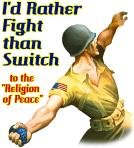 J. Grant Swank, Jr.
J. Grant Swank, Jr.“There are signs that the student movement is going to be revived again.”
Maybe so.
“’They told [my parents] that I was going to be executed, then I heard my mother faint and then my father cried and begged them not to kill me.’”
BBC News reports that students fought for freedom throughout Iran on July 9, 1999.
The demonstration spread from Tehran University. Students were clubbed, some were murdered by police.
Mohammad Reza Kasrani remembers it well: “It was Friday evening 9 July when a friend told me about the attack on the students’ dormitory in Tehran university, which had happened early in the morning.
“I rushed there. God, it could not be described in any words: walls demolished, cupboards destroyed, students’ belongings thrown out through the windows. Even some students who had been sleeping or doing their morning prayers were thrown out through the windows from the second and the third floors.
“A group of vigilantes, who are called ‘plainclothes’, had attacked students who the day before were peacefully demonstrating in protest at the closure of a reformist newspaper by the judiciary. During the five days after the attack, while the students staged demonstrations, the plainclothes attacked government buildings and set buses on fire, but it was the students who were later blamed for this vandalism.
“The ‘plainclothes’ attacked the students by sticks and batons and even fired tear gas. The students were not organized and their movement had no leadership, they just acted in an atmosphere filled with emotion and sensitivity. All the students wanted was to bring those who attacked the dormitory to justice but, as the protest and unrest went on, more radical people joined the movement and slogans against the country’s leaders were chanted.
“The unrest was brutally suppressed after five days.
“It was on the fifth day that I was arrested by the agents of the intelligence ministry, while standing by the gate of Tehran University. They put me in a cage, which was laid on the back of a pickup truck, and took me to a building which belonged to the police.
“They took me out of the van when we reached the yard. From there to the door leading into the building soldiers were standing in rows on both sides, which reminded me of a ‘corridor of fear’. Then they beat me and two other students severely. They told us to sit and stand up many times that our knees were locked and we fell on the ground; they beat us again.
“Finally, they blindfolded us and took us to a hall inside the building. They made me sit on a chair. Somebody came and opened my blindfold and showed me a student statement and asked me if I believed in what was said in that text. I said yes. When he left, another one in a commando uniform came in. He beat me hard.
“They only kept me one day in that building, and then I was transferred to Evin Prison and, later, a police detention center for interrogation. In that detention center, they beat me on the soles of the feet with a cable for four continuous days and I was also subject to psychological torture for a month.
“They told us that were would be executed.
“At one stage, I heard the voices of my parents from another room. They were told that I was going to be executed. Then I heard my mother faint and then my father cried and begged them not to kill me.
“I heard them say to my parents: ‘For this bastard, you should not even read Koran after his death.’ I said to God: ‘I am going to be killed for my country’s freedom and for my religion, now my parents cannot even mourn for me.’
“Later, when I was freed, I found out that they played the recorded voice of my parents from another room. They put me in a situation where I was totally convinced my parents were being tortured. Before I was arrested, I always believed that we could criticize the Islamic establishment by peaceful dialogue and that the officials would reform the system.
“But after my arrest, my belief has completely changed. I have reached the conclusion that the
officials are not thinking for reforms at all. I think the student movement in Iran is living in very uncertain situation.
“The government has been able to create an atmosphere of terror which has led to the students’ frustration.
But I believe this phase would be a transitional one. There are signs that the student movement is going to be revived again.”
Visit “Iran student protests: Five years on”
http://news.bbc.co.uk/2/hi/middle_east/3879535.stm
From truthinconviction.us/weblog.php














No comments:
Post a Comment